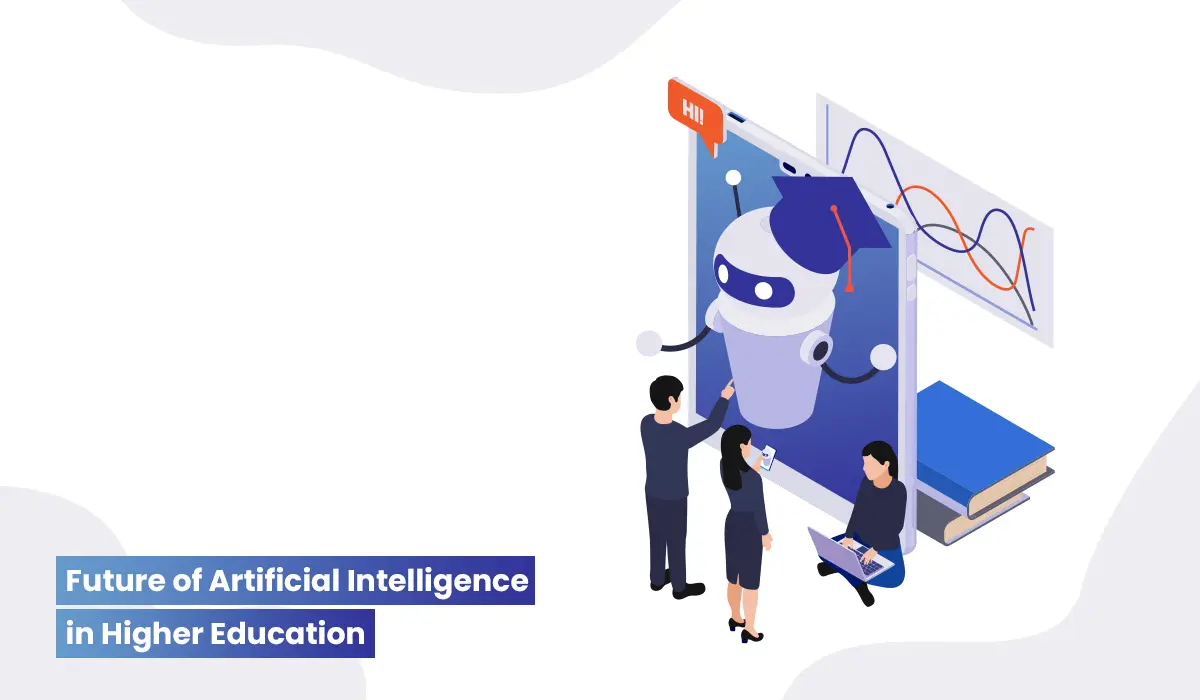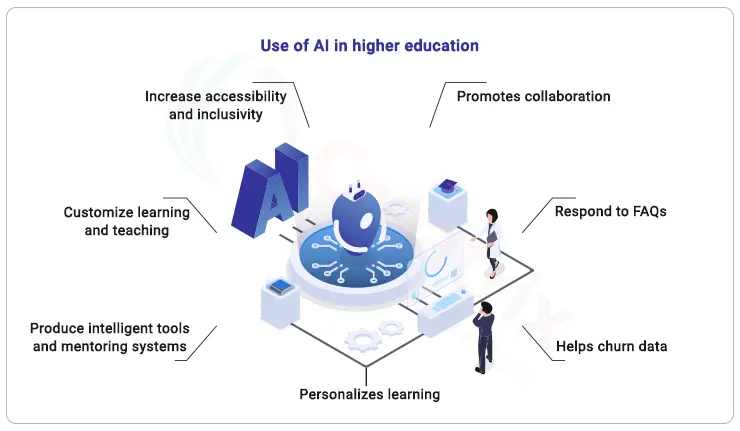15 Predictions for the Future of Artificial Intelligence in Higher Education in 2024

Artificial intelligence enthusiasts and skeptics got treated to the wonders of Machine Learning in 2022. At the surface level, Artificial Intelligence in Higher Education is a dedicated tool that can perform complex tasks in HEIs - be it for collaborating with students, bettering Learning and Teaching, or streamlining mundane manual tasks - AI is delivered on various fronts that education stakeholders can appreciate.
Now that 2022's AI journey appears to have come to an end, we wanted to see what lies in store for Artificial Intelligence in 2023. We, therefore, have collated our insights into what the near future will entail for Artificial Intelligence in Higher Education in this post.
Use of Artificial Intelligence in Higher Education

From assessment to personalized learning, and automated grading, it’s clear that artificial intelligence is already adding value in the higher education sector. However, adopting AI can be daunting for institutions lacking the time, expertise, and resources to explore its many uses.
- AI will produce intelligent tools and mentoring systems
- AI automation can help with time-consuming and tedious tasks like record-keeping and grading multiple-choice tests
- AI can offer customized learning and teaching experiences
- AI will increase accessibility and inclusivity in education
- It helps use data to produce the desired results
- Foster collaboration
- Auto grading of assessments and assignments
- Access to learning resources from anywhere, anytime
- Chatbots can respond to frequently asked questions
- AI tutors and chatbots can be available at any time to answer questions
- Through personalized programs, learning can be tailored and adapted to each student's goals and abilities
Predictions for the future of Artificial Intelligence in Higher Education
AI is used a lot in higher education to improve teaching and learning, speed up administrative tasks, and spark new ideas. In the higher education industry, we might see the following big changes in the next few years:
- Personalized learning: AI can be used to provide personalized learning experiences for students, adjusting course content and recommendations based on their unique interests and needs. This can aid in enhancing student engagement and outcomes, and may also raise retention rates.
- Better help with AI-powered virtual helpers: AI-powered virtual chatbots can boost efficiency. For instance, students can utilize virtual assistants to obtain answers to frequently asked questions, gain access to course materials, and organize meetings with advisors, reducing their time running around to the office.
- Use data to predict student outcomes: AI can be used to examine student data in order to predict academic success and identify students at risk. This can assist universities in providing students with tailored support and interventions to ensure their success.
- Automate everyday operations: AI for higher education can be utilized to automate administrative operations like scheduling, grading, and transcripts, allowing academics and staff to focus on higher-impact endeavors.
- Discover trends and gaps: AI can assist academics in analyzing massive datasets and identifying trends and patterns, enhancing research productivity and fostering creativity.
- Enhancing student support services: AI-powered chatbots and virtual assistants can be used to provide students with quick and convenient access to support services, such as mental health counseling and tutoring.
- Improve accessibility: AI-powered tools, such as text-to-speech and translation software, can help to make educational materials and resources more accessible to students with disabilities.
- Enhance online learning: AI for higher education can be used to create personalized and engaging online learning experiences, using techniques such as adaptive learning and gamification.
- Streamlined admissions process: AI can be used to analyze student data and predict the likelihood of academic success, helping admissions committees to make more informed decisions about which students to admit.
- Advanced placement results: With AI-powered assistance in employment services, higher ed’s placement cells can automate resume evaluation and job recommendation processes with immediate approvals and rejections. This kind of upper hand can assist students in identifying and pursuing career options that match their abilities and interests in no time!
- Better student engagement and outcomes: Using approaches such as adaptive learning and gamification, higher education artificial intelligence can be utilized to provide individualized and engaging learning experiences for students. This can aid in enhancing student engagement and outcomes, and may also raise retention rates.
- Instant feedback and support: Delivering more constant and objective feedback to students, AI-powered grading solutions can minimize faculty burden and enhance the accuracy of grading by providing more consistent and objective feedback.
- Prevent cyber threats: AI can be used to keep an eye on institutions and protect them from cyber threats like phishing attacks and malware.
- Balances emotional well-being: Students' emotional state has an impact on their ability to concentrate, engage, and maintain their motivation for learning. With the future of AI set with emotion recognition technology, virtual learning environments can be just as productive as traditional classrooms. It can also identify students' areas of weakness and provide support so they can get better and ultimately succeed.
- Out-of-the-world student advising services: AI can be used to deliver individualized recommendations and support to students, assisting them in navigating their educational experience and achieving their objectives.
Being prepared for the future
According to the World Economic Forum, many HEIs will have adopted technologies like ML by 2025. To meet the upcoming demand, governments and educational institutions should concentrate on quickly expanding related education and skills, with an emphasis on both STEM and non-cognitive soft skills. It is crucial to give students the skills they need to succeed in a digital workplace. The present is the cornerstone of the workforce of the future. Make a move now, and contact our team to learn more about how you can stay away from disruption using AI.


